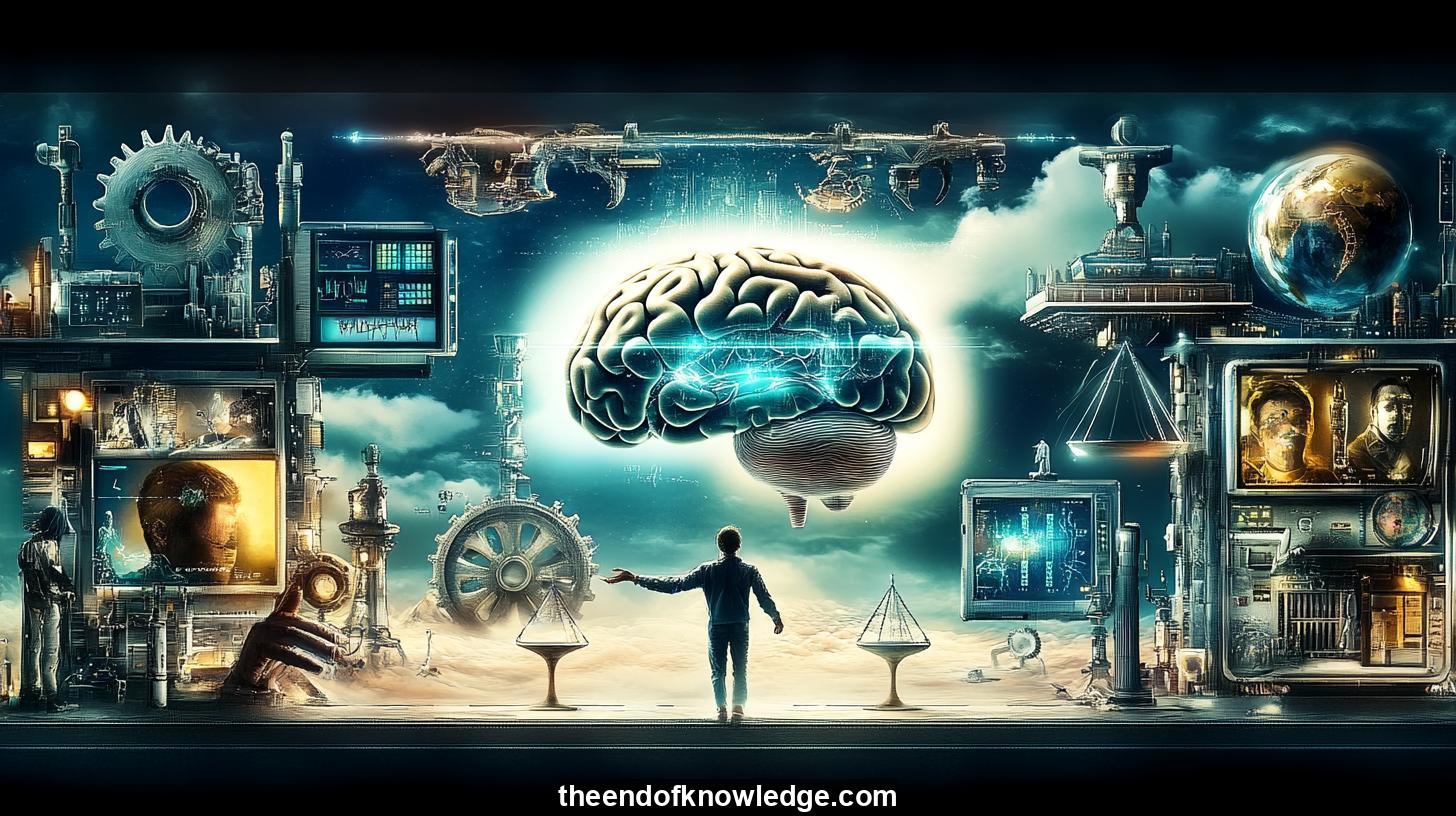Countersevolution.ai : As impacts on our brain the use of artificial intelligence
graph LR
classDef ethics fill:#d4f9d4, font-weight:bold, font-size:14px;
classDef education fill:#f9d4d4, font-weight:bold, font-size:14px;
classDef healthcare fill:#d4d4f9, font-weight:bold, font-size:14px;
classDef workforce fill:#f9f9d4, font-weight:bold, font-size:14px;
classDef philosophy fill:#f9d4f9, font-weight:bold, font-size:14px;
classDef collaboration fill:#d4f9f9, font-weight:bold, font-size:14px;
A[Vault7-101] --> B[Healthcare: AI enhances
neurological diagnostics. 1]
A --> C[Ethics: privacy risks,
algorithmic bias. 2]
A --> D[Education: AI creates
new learning tools. 3]
D --> E[Educators must adapt
teaching methods. 4]
A --> F[Workforce: AI demands
education system reforms. 15]
F --> G[Lifelong learning
essential. 28]
A --> H[Philosophy: AI questions
human identity. 8]
H --> I[Redefines relationships,
emotions. 11]
H --> J[Existential identity
concerns. 18]
A --> K[Collaboration: scientists-policymakers
partnership needed. 10]
K --> L[Prioritize human values
in development. 30]
A --> M[Balanced approach:
manage AI adoption. 7]
M --> N[Human well-being
as focus. 19]
M --> O[Human-AI collaboration
emphasized. 23]
M --> P[Transparent decision-making
processes. 21]
C --> Q[Ethical AI development
crucial. 14]
C --> R[Regulatory frameworks
for healthcare. 12]
B --> S[Early disorder detection
via AI. 13]
B --> T[Patient well-being
priority. 26]
D --> U[Focus on creativity,
critical thinking. 22]
D --> V[Balanced education
integration. 29]
A --> W[Social risks: isolation,
addiction trends. 6]
A --> X[AI as augmentation
tool. 9]
X --> Y[Manage human capability
enhancements. 20]
A --> Z[Generative AI reshapes
problem-solving. 16]
A --> AA[Global challenges
addressable via AI. 27]
class A,B,S,T healthcare;
class C,Q,R ethics;
class D,E,U,V education;
class F,G workforce;
class H,I,J philosophy;
class K,L collaboration;
class M,N,O,P,X,Y,Z,AA ethics;
Resume:
explores the profound impact of artificial intelligence (AI) on human society, particularly focusing on its intersection with neurology, education, and the future of work. It begins by discussing the rapid evolution of AI and its potential to revolutionize healthcare, especially in neurology, where AI can aid in diagnostics, personalized medicine, and the study of brain function. The integration of AI in neurology is seen as a critical step forward, enabling faster and more accurate diagnoses, but it also raises ethical concerns about data privacy, algorithmic bias, and the need for regulatory frameworks.
The discussion then shifts to the broader societal implications of AI, particularly its impact on education and the workforce. highlights how AI is transforming the way we learn and work, with tools like ChatGPT and other generative AI models changing the landscape of education. While these technologies offer unprecedented opportunities for learning and problem-solving, they also pose challenges, such as the potential for decreased critical thinking skills and the need for educators to adapt their methods to incorporate AI effectively.
also delves into the psychological and social effects of AI, particularly its role in exacerbating issues like social isolation, addiction, and the erosion of attention span. It argues that the over-reliance on digital technologies, including AI, has led to a disconnection from human emotions and interpersonal relationships. emphasizes the need for a balanced approach to AI adoption, one that harnesses its benefits while mitigating its negative consequences.
In addition, touches on the philosophical and existential questions raised by AI, such as its potential to redefine human identity and purpose. It explores the idea of AI as a tool for human augmentation, rather than replacement, and the ethical implications of creating machines that can think and act like humans. concludes by calling for a collaborative effort between scientists, policymakers, and educators to ensure that AI is developed and used responsibly, with the goal of enhancing human well-being rather than undermining it.
Overall, presents a nuanced view of AI, acknowledging its transformative potential while urging caution and thoughtful consideration of its far-reaching impacts on society.
30 Key Ideas:
1.- AI is revolutionizing neurology by enhancing diagnostics and personalized medicine.
2.- Ethical concerns in AI include data privacy and algorithmic bias.
3.- AI tools like ChatGPT are transforming education, offering new learning opportunities.
4.- Educators must adapt to incorporate AI into their teaching methods.
5.- Over-reliance on AI may lead to decreased critical thinking skills.
6.- AI exacerbates social isolation and addiction, particularly among adolescents.
7.- highlights the need for a balanced approach to AI adoption.
8.- AI raises philosophical questions about human identity and purpose.
9.- AI should be seen as a tool for human augmentation, not replacement.
10.- Responsible AI development requires collaboration between scientists and policymakers.
11.- AI has the potential to redefine human relationships and emotions.
12.- The integration of AI in healthcare necessitates robust regulatory frameworks.
13.- AI tools can aid in the early detection of neurological disorders.
14.- emphasizes the importance of ethical AI development.
15.- AI's impact on the workforce requires a rethink of education systems.
16.- Generative AI models are changing how we approach problem-solving.
17.- explores the psychological effects of excessive AI use.
18.- AI raises questions about the future of human identity and existence.
19.- calls for a focus on human well-being in AI development.
20.- AI's potential to enhance human capabilities must be carefully managed.
21.- discusses the need for transparency in AI decision-making processes.
22.- AI's role in education requires a focus on critical thinking and creativity.
23.- highlights the importance of human-AI collaboration.
24.- AI's impact on society is both transformative and challenging.
25.- emphasizes the need for ethical guidelines in AI use.
26.- AI's integration into healthcare must prioritize patient well-being.
27.- explores the potential for AI to address global challenges.
28.- AI's impact on the workforce requires a focus on lifelong learning.
29.- calls for a balanced approach to AI adoption in education.
30.- AI's development must prioritize human values and ethical considerations.
Interviews by Plácido Doménech Espí & Guests - Knowledge Vault built byDavid Vivancos 2025
 >
>